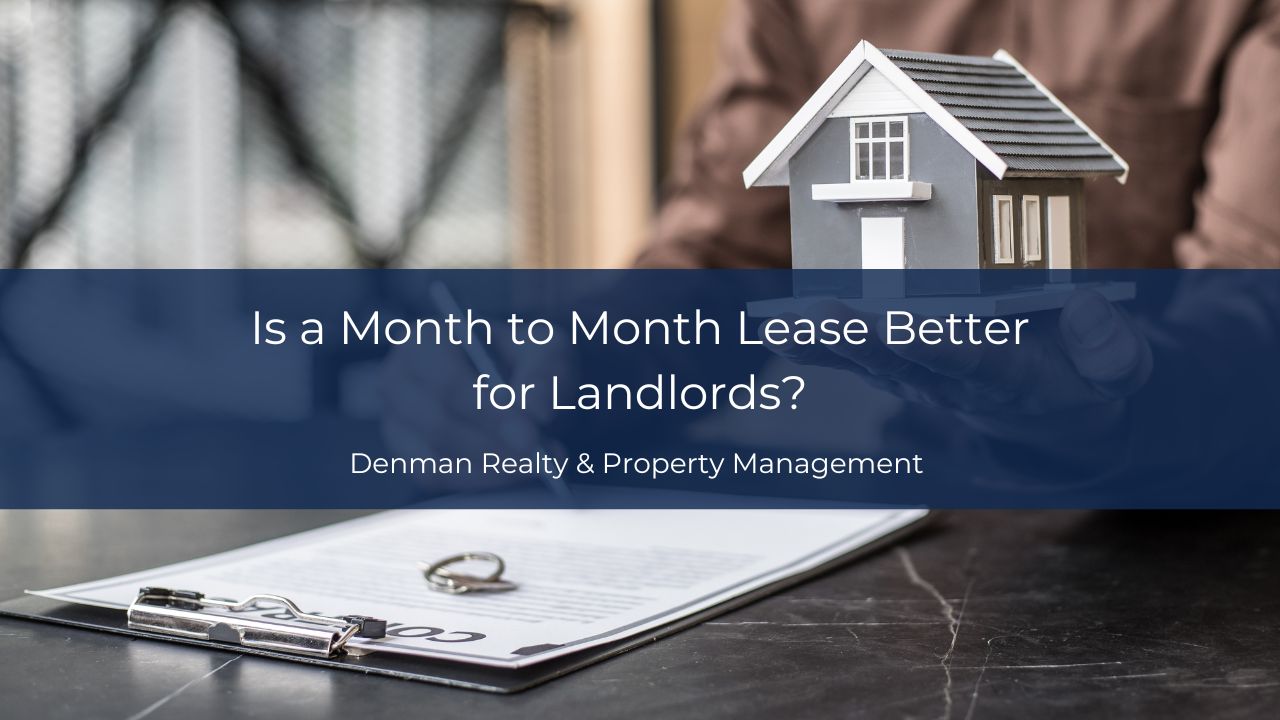Key Takeaways
- Month-to-month leases provide landlords with maximum flexibility to adapt to market changes, raise rents, or sell their properties with minimal delay.
- While these leases can reduce long-term vacancies and command higher rent, they come with a risk of sudden resident turnover and unstable cash flow.
- The administrative burden and increased turnover costs associated with month-to-month agreements may outweigh their benefits for landlords seeking stability.
As a landlord, making decisions that balance flexibility with financial stability is crucial. Month-to-month leases offer a certain level of freedom, but they also come with their own set of challenges.
At Denman Realty & Property Management, we understand that every landlord's situation is unique. In this article, we'll dive into the pros and cons of month-to-month leases, helping you decide if they’re the right fit for your properties and business goals.
Pros of a Month-to-Month Lease for Landlords
Month-to-month leases might be a good option for your property, considering the benefits they can offer. Learn more about the pros below.
Flexibility
A month-to-month lease offers you incredible flexibility. You’re not tied to a long-term commitment, allowing you to make adjustments when needed. For instance, if the rental market shifts, you can raise rent more quickly than with a traditional lease.
You also have the freedom to make changes to your property without the constraints of long-term agreements. This adaptability can be especially useful in dynamic markets like Mesa, where rental trends can change rapidly.

Quick Property Turnover
One of the standout benefits of a month-to-month lease is the ability to turn over your property quickly. If you decide to sell your property, perform major renovations, or even change your rental strategy, ending a month-to-month lease is far easier than a fixed-term lease.
In Mesa, where the real estate market can fluctuate, this freedom can be a huge advantage. You can also make changes that might appeal to different types of residents, ensuring your property remains competitive and desirable in the market without the usual delays.
No Long-Term Commitment
Without a long-term commitment, you can test different strategies and see what works best for you. In Mesa, where market conditions can shift, this lease type offers you the ability to adapt quickly. This ensures that your property is always aligned with your current business goals, providing you with freedom and control over your rental investments.
Higher Rent Potential
Month-to-month can also bring in higher rental income. Many residents are willing to pay a premium for the convenience of short-term agreements. In Mesa’s competitive rental market, residents may prefer a month-to-month lease as it offers them more freedom while they search for a more permanent home.
As a landlord renting out a home, this means you can charge a slightly higher rent in exchange for the flexibility offered to your residents. This can help you maximize your rental income without locking into a longer commitment.

Avoid Long Vacancies
A month-to-month lease is ideal for avoiding long vacancy periods. If a long-term lease ends unexpectedly, it can take weeks or even months to find a new resident. With a month-to-month agreement, you won’t be left with an empty property for too long, and it provides the flexibility to adapt quickly as the market changes or as residents’ needs evolve.
Cons of a Month-to-Month Lease for Landlords
A month-to-month lease has pros and cons for every property owner, so it's important to weigh your options before deciding what to do.
Uncertainty
With a month-to-month lease, you face the challenge of uncertainty. Your residents can decide to leave with as little as 30 days' notice, which means you could suddenly find yourself dealing with a vacancy. In Arizona where rental demand can fluctuate, this can be particularly stressful.
You might struggle to find a new resident quickly, leaving your property empty for longer than you'd like. This unpredictability can disrupt your cash flow and force you to constantly market your property, which can be time-consuming and costly.
Rent Collection Instability
Rent collection can become a bit unstable with month-to-month leases. While you may have more flexibility to increase rent or make changes, the short-term nature of the agreement means that your residents are less committed.
This can lead to inconsistent cash flow, making it harder for you to plan your finances. This lack of financial stability might be a bigger concern during market downturns.

Potential for Disruption
Residents on a month-to-month lease may feel less inclined to settle in. Because they’re not tied to a fixed term, they might not invest in improving the space or feel motivated to maintain it. This can lead to higher turnover rates and more wear and tear on the property itself.
If residents are looking for more permanent housing, this temporary living situation can result in less stability for you as a landlord and create a cycle of turnover.
Frequent Administrative Work
Managing month-to-month leases means more administrative work. Each month, you may need to update rental agreements, ensure you’re legally compliant with local laws, and stay on top of communication with your residents.
For landlords in Mesa, this can take up valuable time that could otherwise be spent focusing on your property’s maintenance or looking for new investment opportunities. Additionally, more paperwork can lead to increased costs for legal assistance or property management services, making it a more labor-intensive process than traditional leases.
Higher Turnover Costs
Higher turnover costs are another challenge with month-to-month leases. Since your residents can leave at any time, you may face a more frequent need to clean, repair, and re-advertise the property. Each vacancy brings with it expenses like repainting, fixing wear and tear, and marketing the unit again.

These costs can add up quickly if you have to find new residents regularly. The increased turnover rate can eat into your profits, making month-to-month leases less financially efficient over time.
Bottom Line
Whether or not a month-to-month lease is right for you depends on your unique goals as a landlord. Denman Realty & Property Management in Mesa can help you navigate these decisions, offering expert advice tailored to your investment strategy. Reach out today to discuss the best leasing and management options for your property!



